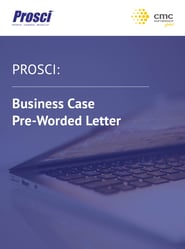Regardless of profession, many people still face deep underlying challenges where they do not know how to best quantify the benefits and return on investment (ROI) of change management. Lacking a powerful, formal business case template to establish the basis for applying change management can be detrimental to securing executive buy-in.
A business case captures the reasoning for initiating a project or task and helps convince a decision maker to take action.
The business case is a powerful driver for presenting the rationale behind change management and the approach required to make it successful as it helps address the common objections or challenges that arise when change management is mentioned.
Through highlighting change management using a business case, you can gain credibility, make the connection between the people side of change and project outcomes, and make change management real for your audiences.
Recently, there has been growing recognition of the need for change management. However, many change management practitioners still find themselves fighting to get commitment, support and resources that they need on a project.
In Prosci's 2016 Best Practices study, participants who had an influence on their change management budget and resources, described why they had influence. Number 3 on the list was that they presented a business case.
Participants presented a business case that included goals, outcomes, and a well-defined Return on Investment. Participants reported higher success with influencing the budget when they could lay out the business reasons for implementing change management.
In this blog, we will present to you how developing an effective business case for change management can ensure you secure executive buy-in for your change initiative.
Download: Business Case for Change Management Pre-Worded Letter
Gain Credibility
One of the biggest benefits of a business case for change management is its credibility; a business case is a recognised credible document. Your senior leaders and executives alike will be familiar with the structure, format, and use of a business case. Use of a business case will address situational assessments, project descriptions, solution descriptions and cost-benefit analyses, all of which your leaders will want to know when evaluating and coming to a decision.
You also gain credibility through the effort you put into writing the business case. Through putting in a considerable amount of time and effort into writing a business case shows that you have considered and thought through various aspects of change management. Presenting change management like other efforts in the organisation are presented, will help highlight the importance of change management.
With the business case as your driver for a change initiative, you can clearly demonstrate the need, value and approach for managing the people side of change to your executives.
Create the Connection Between People Side of Change and Project Outcomes
One of the biggest issues faced by change management practitioners is creating a connection between the people side of change to getting the expected results and outcomes from the change project - what executives really care about!
With a business case you can clearly present the connection between project outcomes and how many of those outcome require staff to change the way that they do their jobs in the future state. In particular, the situational assessment and problem statement section of the business case lets you explain the rationale of your change management proposition in the appropriate context. This correlates directly to the benefit realisation, results and outcomes of the change.
The situational assessment and problem statement section of the business case is your venue for showing how project results are tied to the people side of change.
Make Change Management Real For Your Audiences
One of the biggest reasons executives are reluctant to support change management is simply because they are not sure what it means to apply change management on a project. A lot of our clients tell us that senior leaders in their organisations simply see change management as "comms" before go-live. Through a business case you are given specific opportunities to make change management real for your audiences, and to make them realise that it is much more than that.
One of the biggest benefits of writing a business case for change management is that you are able to explain the value of change management in a language that your audience understands.
Through the business case you are able to present 3 aspects of your proposal for change management: Overview, Scope, and Objectives. Putting change management into terms that your leaders are familiar with removes the uncertainty that surrounds change management.
You know the value of change management. You know how to apply change management on a project. But how do you present this to your executives?
If you have ever struggled to gain support, resources, and funding for change management from leaders, next time try presenting your case in a structured, formal document that they are familiar with - the business case!
If you're ready to present change management to your management team, but are not sure where to start, gain buy-in and resources with the help of our Prosci Case for Change Management template. Download here!



